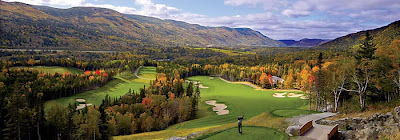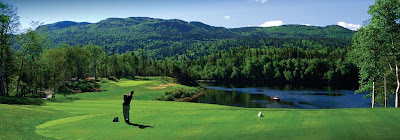Newfoundland offers all the challenges for adventure lovers – and loads of fun, says Charles Starmer-Smith.
By Charles Starmer-Smith Last Updated: 3:47PM BST 07 Aug 2008
"Time to pucker up, m’by,” said the Humber Valley fisherman in his yellow sou’wester as he shoved an ugly old trout towards me. As he was also brandishing an oar, I had little option but to brace myself for the wettest lips in town. I had heard much about the famous Newfoundland welcome, but this was not what I had envisaged when I popped into Sully’s pub for a quiet beer. Then again, when the locals have 50 different words for “snow”, live in towns with names such as Dildo, Blow Me Down and Pothead, and have their own time zone half an hour ahead of the Canadian mainland, perhaps I should not have been surprised.
The fish-kissing, along with eating unleavened bread and drinking Screech (the local rum), was part of a traditional ceremony to make me an honorary “Newfie”. But the gimmicky ritual was unnecessary, for in a week on this island off Canada’s east coast I had already seen enough to feel a strong affinity with the former British colony.
Telegraph Travel readers who enjoy the Tolkien-esque landscapes of New Zealand will love Newfoundland. In just seven days I had come face to face with towering icebergs, witnessed whales frolicking in sheltered bays, fished in salmon-filled rivers, cruised on placid lakes, hiked through volcanic hills and abseiled down sparkling waterfalls. And thanks to new direct flights from Gatwick with Monarch, all this lies less than five hours away.
Despite Newfoundland’s proximity to the British Isles and the close links between them — still heard in the difficult-to-understand Irish-cum-West Country-cum-Canuck accents — this land has barely registered on the consciousness of British and Irish holidaymakers. Some will have had their view of Newfoundland shaped by E Annie Proulx’s novel The Shipping News (subsequently filmed with Kevin Spacey and Judi Dench ) — a haunting portrayal of incest, abuse and life in a bleak, wind-swept landscape. Proulx claimed to have “liked this harsh, bony, bare, empty, cruel and beautiful place so much I could not bear it.” But many locals could not bear her novel: it may have put Newfoundland on the map, but not necessarily for the right reasons.
As I arrived in the verdant Humber Valley , I too found the desolate picture she painted hard to reconcile with what I saw. The sun was burning away the wispy layer of mist over Deer Lake, revealing pine-clad hills and pastel-shaded chalets that descended down to the water’s edge, while behind an emerald-green championship golf course snaked through the forests.
The Humber Valley Resort is the brainchild of Brian Dobbin, a Canadian businessman, and the island’s first major step into the luxury tourism market. Hot tubs, spa treatments, manicured fairways and fine dining have entered the Newfoundland holiday lexicon for the first time; while the 250 chalets, measuring up to 7,000sq ft, are huge even by Canadian standards.
Alongside the pampering, there are plenty of adventures on offer: caving, rafting, fishing, quad-biking, mountain-biking and more (in winter quad bikes and hiking boots are swapped for snowmobiles and skis as the slopes of Marble Mountain and the vast backcountry around Deer Lake become a snowy playground). It all sounded great — but I wished I had read up about canyoning before signing up. After a couple of hours of negotiating rapids, rock climbs and jumps, I found myself teetering at the top of a raging 60-foot waterfall, the current threatening to sweep me over the precipice. My guide gave the thumbs-up and I leaned back on the rope, my legs shaking as I searched for safe footholds, the water hammering around my waist. Inch by inch I lowered myself down. Terra firma never felt so good.
Seeking respite the next day from the adrenaline adventures, I waded deep into the Humber River to cast my line in search of the elusive Atlantic salmon , before testing my swing on the impressive River Course, created by the renowned Canadian golf designer Doug Carrick. I was joined by Mike Clewer, the resort director, who came here from London a few years ago — a move he describes as both a challenge and the best choice he has ever made. Just then, a black fox scuttled out from the bushes on the sixth hole, picked up the boss’s ball from the edge of the green and deposited it by the flag for an easy birdie. Clearly the locals were already attuned to their director’s wishes.
It was not easy to leave the creature comforts of the Humber Valley Resort, but the wilds and wonders of the west coast beckoned. It is 21 years since Gros Morne National Park earned Unesco World Heritage status, and since then it has developed a network of trails, activity centres and information points inviting visitors to hike through The Lord of the Rings-like landscapes, camp by the sea or kayak beneath the towering cliffs of fjords. The accommodation in these fishing communities is basic but surprisingly comfortable — Red Mantle Lodge, with its breathtaking views, and the Swiss-owned Neddies Harbour Inn, with its fine dining, were my favourites.
But first you have to survive the drive. The journey from Humber takes you deep into moose country. In the 130 years since a pair of these giant deer was introduced to the island, their numbers have swollen to 130,000. The park is said to have the highest concentration of moose on earth; judging by the number I spotted lolloping near the roadside, and the signs warning drivers to be wary of these “Newfoundland Speedbumps”, I can well believe it.
Once in the park, I set off on the trail of whales: on an evening boat trip around Norris Point. As we left the mooring I wondered if I had misunderstood the shock jock in charge of the microphone, as he screeched (with plenty of Screech inside him): “If you want to get naked. Get naked!” Judging by the nervous looks on the faces of the septuagenarian cruisers around me, it seemed I had heard right. But thankfully the cagoules and cardigans stayed on, despite the free-flowing alcohol and a band below deck belting out George Jones’s If Drinking Don’t Kill Me. Instead there was a more inviting spectacle on offer, as minke whales, back from winter in the Caribbean, surfaced time and again in front of the prow.
Early the next morning I headed to the Tablelands. When I arrived, the giant slabs of red peridotite rock — forced up from the earth’s mantle as a result of tectonic collisions — rose above the dawn mist like a set of giant mahogany tables. Cape Town’s own Table Mountain, by comparison, seemed like a flat-packed Ikea version. But the park’s showpiece is Western Brook Pond, a 19-mile freshwater fjord reminiscent of New Zealand’s Milford Sound. Our boat chugged along the foot of 2,000-foot volcanic cliffs, past giant waterfalls cascading down to the glassy surface of the lake, as condors and bald eagles swooped high above. Few returned with camera memory cards less than full.
Back in the car, I rejoined the coastal road, heading towards the Great Northern Peninsula . The land flattened out. Forests of twisted spruce and balsam fir appeared to have been given the hairdryer treatment, the trees almost horizontal from the winds. Yet as I thundered through these bleak, plains, I passed small communities that seemed to have sprung from nowhere, of houses whose front doors were decorated with huge antlers, isolated fishing huts with smoke billowing from the chimney and lone cyclists straining at their pedals. In this harsh landscape it is no wonder that humour and hospitality are such important facets of life.
As I approached the tip of the northern peninsula, I stopped at L’Anse Aux Meadows , site of the first European settlement in the New World. Leif Ericson and his band of Norsemen arrived here from Greenland in around 1000AD, and established a base on this sliver of land in order to explore farther south. Today the site includes a reconstruction of the traditional sod huts, complete with a few locals dressed in character. But the harsh realities of this landscape proved too much even for hardened Norsemen, who remained here for barely 20 years.
In fact northern Newfoundland is littered with ghost towns, including the former fishing community of Quirpon Island . As an old sea dog ferried me over from the mainland in an even older wooden boat, the powerful North Atlantic surf did its best to slam us against the craggy rocks. The first sight of the Cape Bauld lighthouse and its guesthouse, perched high on the windswept cliffs, underlined the hardiness of generations of lighthouse keepers. I was thankful for a few rays of sun as I joined Ed English, who now runs the place, on a kayak expedition. The waters are a prime viewing spot for whales — orca, minke and beluga — and are known as Iceberg Alley, for good reason: giant boulders of ice, carried from Greenland by the Labrador current, pepper the skyline.
You have no real concept of their size and beauty until you get up close. As we rounded the corner of a bay, there it was: iceberg, dead ahead. Bobbing and swaying gently on the swell, we paddled gingerly until a wall of ice, shaped like the hull of a cruise ship, towered above us. Blue transluscent streaks ran like arteries through the layers of hard-packed ice; overcome by an urge to touch it, I paddled ever closer — until Ed warned me that the icebergs have a tendency to flip or even explode.
Back at the guesthouse I found the other guests sitting on the wooden helicopter platform that juts out over the ocean. Silhouettes of these glacial fragments speckled the horizon; orca whales and seals breached and frolicked in the swell as a blood-red sun set over the Labrador Sea.
As it grew dark, music drifted out from inside. In a region where electricity and television arrived late, Newfies have always made their own entertainment. We packed in for a “kitchen party”: out came the guitar, and Ed’s family and friends took turns to sing haunting tales of life at sea, followed by rollicking country numbers. The guitar was soon passed on, and guests invited to perform songs from their homeland. With scarlet cheeks, I managed just a few verses of a U2 cover — which would have had Bono thinking malo — before passing the guitar back, cursing my English reserve.
After saying our goodbyes the next morning, we headed back to the main island with the same craggy-faced mariner. As I left the dock and wandered back to my hire car, an old man emerged from his ramshackle fishing cottage to greet me. Leaning against his postbox, Bill Bartlett told me he belonged to the fifth generation of Bartletts to have been involved with the lighthouse, his family had guided mariners into the harbour for 200 years. I told him that half my family were also called Bartlett — no lighthouse keepers among them, unfortunately, as they come from a small village in Somerset. He blinked a few times — and said, with a chuckle, that his relatives hailed from the same area.
Could it be that in the farthest-flung corner of Newfoundland I had family? I am checking it out with the genealogists...
Source: Telegraph.co.uk By Charles Starmer-Smith






